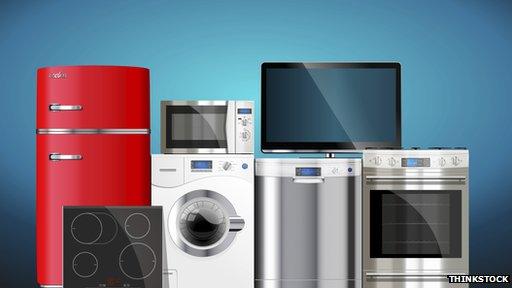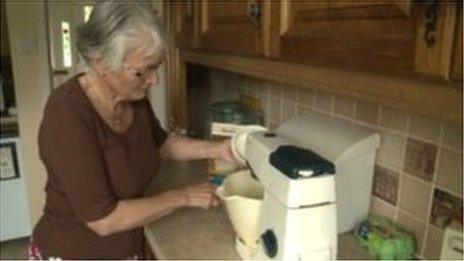Getting in a spin: Why washing machines are no longer built to last
- Published
- comments
Nigel Cassidy reports on the lifespan of appliances
Remember that old washing machine you bought back in the 1980s? The one that seemed to go on for ever?
And then there was the one you bought only a couple of years back, which seemed to give up the ghost more quickly than an ultra-fast spin cycle.
They don't build them like they used to.
Even the industry admits that the lifespan of white goods has fallen. But then so too have prices.
So how long should a fridge or a freezer last, and is it worth spending a bit more on a better model?
'Going strong'
Ann Barlow is expecting a visit from her grandchildren and begins mixing the ingredients for a cake.

Ann Barlow has used her Kenwood Chef for over 40 years
They are soon whizzing round effortlessly, if not noiselessly, in the same trusty electric mixer that she has used for 40 years.
It is a Kenwood Chef bought locally in the West Midlands. Then - at the time of the miners' strike - it would have cost around a month's wages.
But for Ann Barlow, it was her best buy ever.
"I hoped it would last well, but had no idea it would still be going strong for this long. It's never even been in for a service. It is a little bit noisy now, but that doesn't matter", she says.
'Conking out'
Our relentless demand for cheap household appliances is taking its toll on the durability of the products we buy.
Blame it on the smartphone.
With new technology constantly offering fresh features, many people have got used to the idea of upgrading devices nearly every year.
As a result, it seems our expectation of the lifespan of household gadgets is also reducing.
Shoppers constantly search online for the best deals and High Street retailers have to compete to make sales.
It is this erosion of prices which has inevitably taken its toll on the build quality and longevity of mass-market products.

Cheaper prices for white goods inevitably mean lower build quality
On its website, external, the Whitegoods Trade Association (WTA) openly acknowledges that the average lifespan has dropped in relation to prices.
Take the example of a washing machine.
Its life expectancy has dropped by a full three years over the last decade or so, meaning many will conk out pretty quickly.
"Over 40% cost under £300. Obviously these cheaper products do not have the same build quality, performance or longevity and therefore the average lifespan has dropped from over 10 years to under seven years," the website confesses.
It is not unusual for cheaper appliances to only last a few years.
Premature scrapping
The move to buying online has also broken the link between consumers and local businesses.
Such businesses once serviced everything they sold, sometimes way beyond its official guarantee period.
Collectively, the retail industry no longer even trains many domestic engineers.
But the independent sector is fighting back.
Robert Chapman is managing director of Chapmans, a family electrical business at Cradley Heath in the West Midlands - with a history going back to 1927.
His company takes pride in its guaranteed repair service. When it comes to breakdowns, he says nine out of 10 washing machines and three-quarters of flat-screen televisions can be restored to perfect working order.
"There is too much premature scrapping," he says.
"The trouble is it's in the interests of manufacturers to get three sales out of people every 10 years -- not one. Because they don't have repair departments that make profits, customers are always pointed towards new products," he claims.
'Trusty' appliances
If an appliance has let you down and you are considering a claim against the makers or sellers, it is worth considering typical product lifespans before rushing to the courts.
Hannah Davies is a trading standards officer with Birmingham City Council.
She points out that consumer law does not underwrite six years of use, as is commonly believed.
She says it depends how much you paid for the product, and how much you have used it.
"Let's say you paid £199 for a washing machine and used it three to four times a day every day for four or five years, then the court would probably say that you have had enough use out of that product. But if you had spent £1,000 and used your machine for a minimal amount of time, the law would probably say you would be entitled to a refund of part of the amount or a repair."
So is it worth shelling out extra for a trusted, premium brand?
The answer is not clear-cut. The premium appliance could give you 20 years' service. It's certainly the best choice if reliability and durability are paramount -- and if you can afford it.
But if you don't have the budget and your use of the product will be lighter, then a cheaper model may be perfectly adequate.
Some people like the idea of being able to replace their technology as soon as possible.
Others, like Ann Barlow, pride themselves on sticking with their trusty appliances of old.
- Published4 May 2014
